
How is it possible to drink too much water?
Health authorities have educated us that drinking enough water is absolutely vital for our bodies to function properly. And it is—unless you drink too much of it. Though most people look out for the signs of dehydration, experts say overhydration can be equally as dangerous.
Drinking too much water generally results in nothing worse than a frequent flier pass to the restroom—but under certain circumstances, it can cause extreme illness and even death, says Austin DeRosa, MD, urologist with UCHealth Cancer Center in Highlands Ranch, Colorado and chair of robotic surgery at the University of Colorado Medicine. Hyponatremia, sometimes called “water intoxication,” causes abnormally low levels of sodium and other electrolytes in your bloodstream, which then can lead to serious health problems such as seizures, coma, and, in rare cases, is fatal, he explains.
Here, doctors share with The Healthy @Reader’s Digest how in severe cases, water intoxication can lead to serious health problems including seizures, coma, and, in rare cases, even death. “The idea that you should only drink water and that you can’t drink too much of it is one of the most common health myths I hear from my patients,” says Jennifer Caudle, MD, board-certified family medicine physician and associate professor at Rowan University School of Osteopathic Medicine in New Jersey. “This is a very dangerous myth because you absolutely can drink too much water, and it can have serious consequences.”
The good news is, there can be plenty of signs that suggest you may be among the overzealous sipping set. If so, it’s likely you believe you’re just taking great care of yourself, and that’s definitely a solid goal…but, by chance, are you drinking too much water?
Read up on the signs of overhydration from recognized clinical leaders. Also, check out another popular probe: Is It Bad to Drink Water That’s Been Sitting Overnight—Or Longer?

You never leave the house without a water bottle and constantly have one in hand
If you carry around your water bottle all day and immediately refill it when it depletes, you may be drinking too much water. Constantly adding water to your body can result in low sodium levels in your blood, which, according to the Mayo Clinic, can cause the cells of your body to swell.
This can become particularly dangerous when your brain starts to swell, according to Tamara Hew-Butler, PhD, an exercise science professor at Oakland University in Rochester, MI. “Your brain can only swell about eight to 10 percent before it reaches the skull and it pushes your brain stem out,” says Hew-Butler. Clearly a concerning condition, with more information about it next.

You have throbbing headaches throughout the day
Headaches can be a sign of either overhydration or dehydration. When you drink too much water, the salt concentration in your blood reduces, causing the cells in the organs throughout your body to swell.
Yet again, this can cause an effect on the brain. When your salt concentration is low, your cells grow. Think of it like this: When you drink too much water, your brain actually grows in size and presses against the skull. This added pressure can cause a throbbing headache and more serious health problems, such as brain impairment and trouble breathing.
(Also consider exploring Do Wireless Earbuds Harm Your Brain? A Brain Cancer Doctor Sounds Off.)

You lose the urge to urinate
Controlling urination is a learned skill and is why we “potty train” children at a young age. However, if you constantly overfill your bladder from drinking too much or hold in your urine for too long, you can “untrain” that skill, says Dr. DeRosa. This can make it hard for you to feel when you need to pee or can make you feel like you have to go even when you don’t.
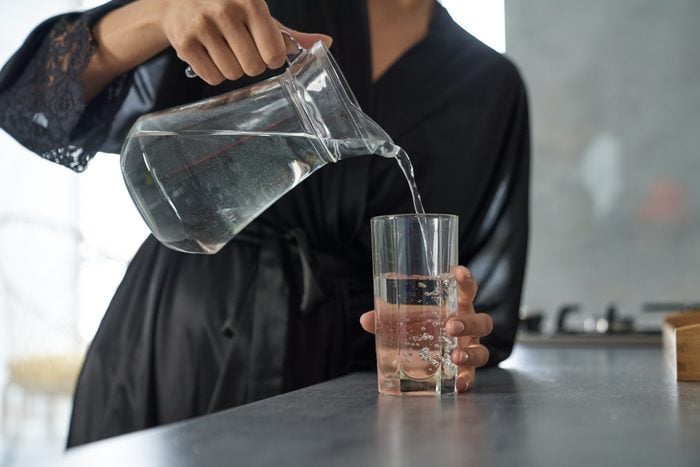
You drink water even when you’re not thirsty
The best way to know if your body really needs more water is to be consciously aware of whether you actually feel a sense of thirst. “Our bodies are so programmed to fight against dehydration because we’ve always been living in fear of scarcity or not having enough,” Hew-Butler says, “so we have all of these built-in mechanisms to protect us against that. Thirst is every body’s individual monitor that lets them know if they need more.”
In response, Dr. Caudle suggests it’s important to learn to become more mindful of your body’s cues—including hunger, fatigue, and thirst.
On the other hand, here are unexpected reasons you might always feel thirsty.
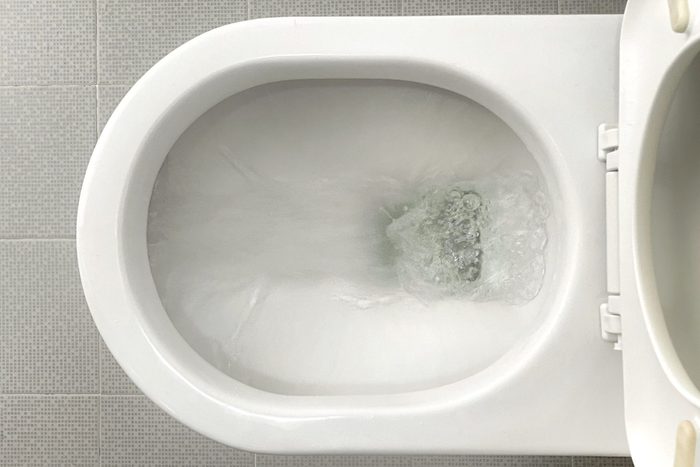
Your urine looks like water
If you’re drinking a healthy amount of water, the color of your urine should be straw-colored to transparent yellow. It’s a myth that clear urine is the healthiest sign of hydration—in fact, says Dr. Caudle, having colorless urine is a clear sign that you’re drinking too much water.
The old rule of thumb is to drink eight to 10 cups of water per day. However, says Dr. Caudle, how much water you need really depends on your height, weight, age, activity, health status, and the weather. Again, the key is to learn to recognize what thirst feels like to your body.
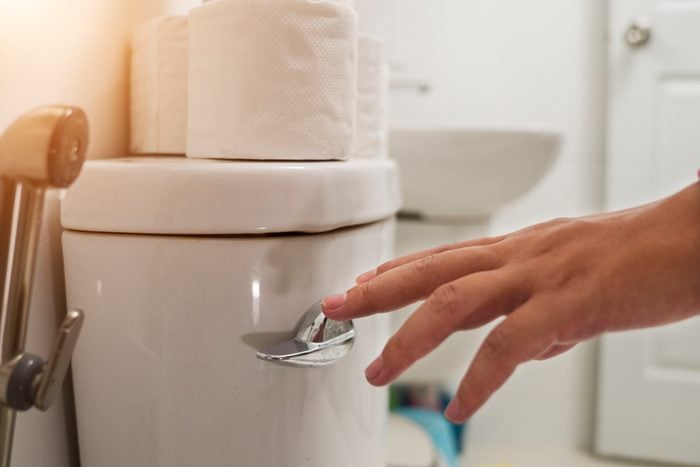
You urinate frequently, including during the night
Using the clinical term for urinating, Dr. DeRosa says, “On average, a person will void between six and 10 times daily, so if you find yourself urinating more than 10 times a day, you may be drinking more water than your body needs.” Waking up more than once during the night to urinate is another red flag over overhydration, he adds.
There are lots of other potential causes of frequent urination, including an overactive bladder or too much caffeine. So, if your water intake falls within a normal range but you’re still peeing every hour, it’s time to talk to your doc. (Frequent urination could be an indicator of diabetes insipidus, too.)
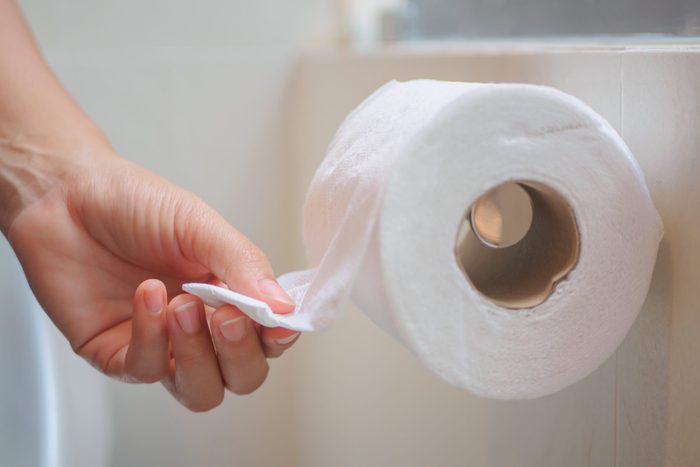
You experience leakage
The average bladder can hold 20 to 30 ounces of liquid before needing to release it—but, says Dr. DeRosa, just because you can stretch your bladder to the size of a grapefruit doesn’t mean that you should.
Many people who overhydrate will try to “hold it” longer, which in turn can lead to bladder leakage. (If you have to pee more often than every two hours, or wake more than once to urinate at night, you may have an overactive bladder.)

You vomit or experience diarrhea or nausea
The symptoms of overhydration look a lot like those of dehydration, Hew-Butler explains. When you drink too much water, your kidneys reach a point where they’re unable to get rid of the excess liquid. That leads to water collecting in your body.
This can cause a number of unpleasant symptoms, often including nausea, vomiting, and diarrhea (for which we’ve got a few home remedies).
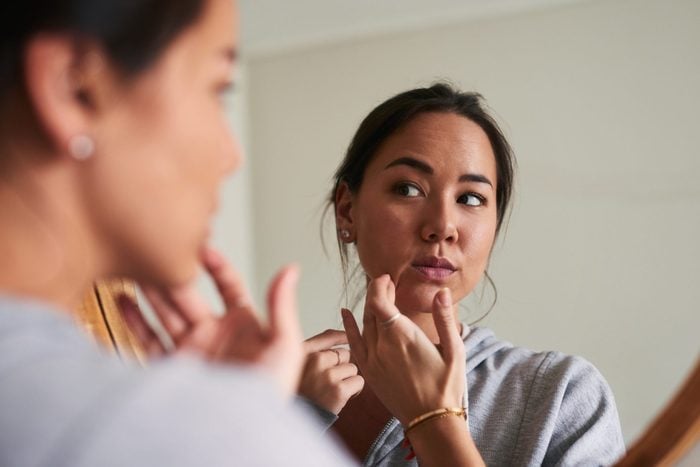
You notice swelling or discoloration in your hands, lips, and feet
In many cases of hyponatremia, people will experience noticeable swelling or discoloration in their hands, lips, and feet, says Dr. Caudle. When all of the cells throughout your body swell, your skin will start to visibly swell as well. (Even in less severe cases, drinking water can lead to looking swollen or bloated.)
People who drink too much water might gain weight suddenly due to swelling and excess water in the bloodstream. If you’re drinking more than 10 cups of water each day and notice swelling or discoloration in your hands, lips, and feet, consider cutting back on your water intake and see if your symptoms subside.
Also, did you know there are actually benefits to plain, hot water?
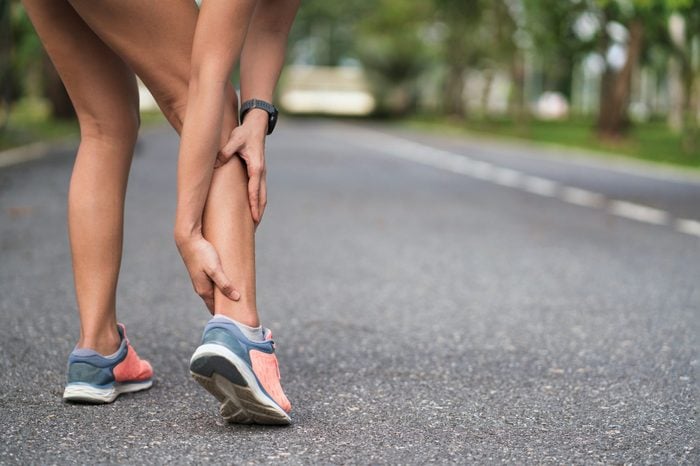
Your muscles feel weak and tend to cramp easily
Having a healthy, fully functioning body is all about balance. When you drink too much water, your electrolyte levels drop and that balance is compromised. Low electrolyte levels can cause a number of unpleasant symptoms, including muscle spasms and cramping.
You can prevent muscle problems by replacing a couple glasses of water a day with coconut water, which is full of electrolytes and 100 percent natural, or an electrolyte drink—our list has several that nutritionists recommend.

You feel tired or fatigued
Your kidneys are responsible for filtering the water you drink through your body and making sure the fluid levels in your bloodstream stay balanced. When you drink too much water, your kidneys have to work even harder, creating a stressful reaction from your hormones that leaves your body stressed and fatigued. If you’re constantly drinking water and find yourself struggling to get out of bed, it may be because you’ve added unneeded stress to your kidneys.
Get The Healthy‘s newsletter for wellness insights that get how you live. Follow us on Facebook and Instagram—and, for more of the latest:
- Here’s How Much Protein You Really Need in a Day, with a Kidney Doctor’s Wisdom
- A Bone Health Doctor Just Listed the 12 Best Yoga Poses to Strengthen Your Bones
- Brooke Shields Exclusive: Her 4 Wellness Must-Haves and the “Extraordinary”Privilege of Aging
- The 10 Best Wellness Books of 2022: Therapists and Readers Rate the Bestselling Health Books So Far This Year


